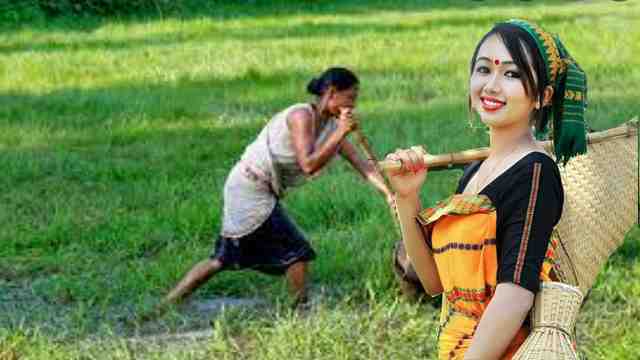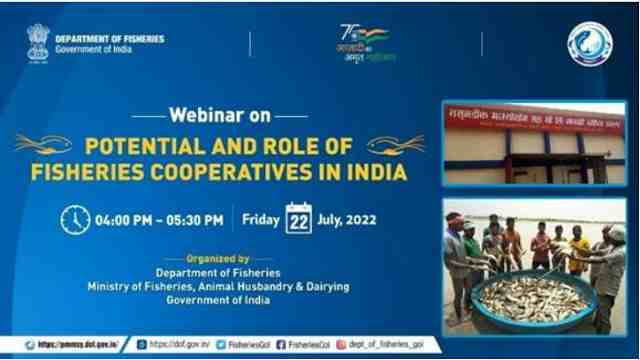New Delhi: The Department of Fisheries (DoF), Ministry of Fisheries, Animal husbandry & Dairying, organized a webinar on “Potential & Role of Fisheries Cooperatives” on Friday, 22 July 2022. This was the 14th webinar organized by the department in an effort to celebrate the ongoing Azadi Ka Amrit Mahotsav, marking 75 years of India’s independence.
 |
| fisheries practitioners and fish farmers join from across India |
The event was presided over by Shri Jatindra Nath Swain, Secretary, Department of Fisheries (DoF), Government of India (GOI) along with Shri Sagar Mehra, Joint Secretary (Inland Fisheries), Dr J Balaji, Joint Secretary (Marine Fisheries) along with other officials of the Department. This webinar was intended to open a forum to initiate a dialogue about the crucial role of fisheries cooperatives in bringing out prosperity in the lives of fish farmers, leading toward holistic sectoral development.
More than 100 participants including expert panelists, fishers, farmers, entrepreneurs, members of fisheries cooperative societies, fisheries officials of different States/UTs, faculties from State Agriculture, Veterinary and Fisheries universities, Fisheries cooperative officers, Scientists, students, and other stakeholders from the fisheries value-chain across the country attended the webinar.
The Webinar began with the welcome address by Dr. Sanjay Pandey, Assistant Commissioner (Fy.), DoF, followed by the opening remarks by Shri Sagar Mehra, JS (IF) who spoke about the importance of fisheries cooperatives in the country. Shri Mehra shared his views on the significance of institutionalizing fisheries cooperatives in India. He also mentioned that fisheries being a sunrise sector, there is a need to learn from the best practices of the dairy, and agriculture industries and try to use the learnings for developing cooperatives in the fisheries sector.
Shri Jatindra Nath Swain, Secretary, of Fisheries said; that with the increased production and productivity in the Indian fisheries sector, the Government has been focusing more on establishing cooperatives to enable small-scale fishers to avail support for institutional credit, quality inputs, transportation, logistic, etc. through collectivization.
 |
| Ministry of FAHD hosts webinar on “Potential & Role of Fisheries Cooperatives” as part of Azadi Ka Amrit Mahotsav |
The FFPOs scheme under PMMSY strives to achieve inclusive and sustainable transformation of the fisheries sector through the creation of 720 FFPOs with an earmarked investment of Rs. 135 crores. While 500 FFPOs are to be formed under PMMSY, the remaining 220 FFPOs are to be set up through convergence of the ongoing FPO Scheme with the Department of Agriculture and Farmers Welfare, GoI. The Department of Fisheries so far has made a head start in setting up 90+ FFPOs worth Rs. 47.80 Crores with the help of NCDC and the National Fisheries Development Board (NFDB).
Under the Pradhan Mantri Matsya Sampada Yojana (PMMSY), the government envisages a vital role for Fish Farmers Producers Organization (FFPOs) to boost growth and competitiveness in the fisheries sector. While the Government encourages the States/UTs to mobilize members and come forward with proposals for establishing fisheries cooperatives, it is important to create a handholding mechanism and build the capacity of the member fish farmers/fishers from the inception of any cooperative or FFPO.
This scheme aims to facilitate the development of a viable and sustainable fish farming income generation model that would bring out socio-economic development and the well-being of fishing communities in a holistic manner.
- A guru is a true guide. Guru is very important in our life. गुरु
- Role of MSMEs in the Manufacturing Sector
Shri Sandeep Kumar Nayak, Director General, NCP; Dr. K.P. Rajan, Director, DNS Regional Institute of Cooperative Management, Patna; Dr. S. Noorjahan Beevi, Additional Director of Fisheries, Tamil Nadu and Mr. Anil Rana, Board of Director, AgriOrganic Producer Company Ltd, Una, HP shared their valuable thoughts during the expert panel sessions. Towards the end, the forum was open for an interactive discussion with a wide range of questions and answers from all participants.